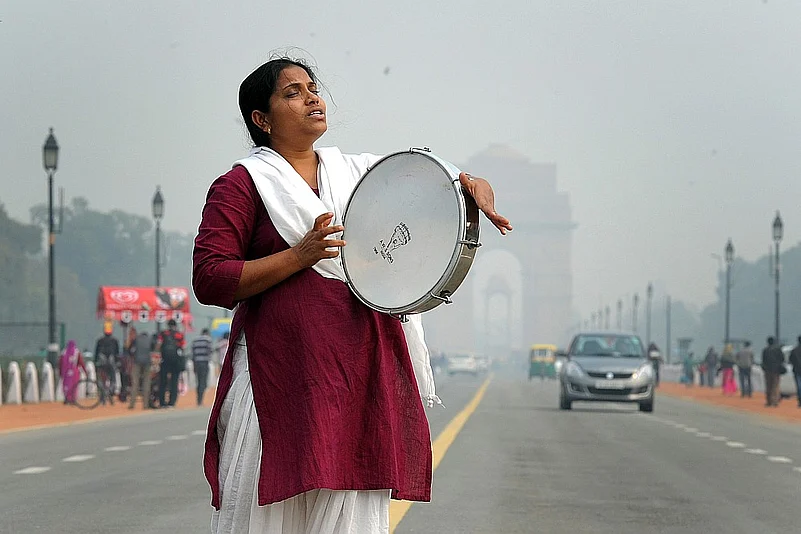From Solapur to Mumbai to Bangalore, she is followed by groups who disrupt and even shut down her performances. Twenty-nine-year-old Sheetal Sathe — wife to Sachin Mali, mother to Abhang, and Maoist to the Government — travels around the country singing on social issues. Since 2004, this gold medallist from Pune's Fergusson College and a trained singer has been singing on social issues.
At a recent performance in New Delhi, she begins by asking the audience, "If it's not too difficult for you, can I hear a 'Jai Bhim?'" "Jai Bhim," replies the audience, hailing BR Ambedkar. Kabir Kala Manch (KKM) of which she is a member is ideologically opposed to Maoists, she says, and instead puts its faith in the Constitution and Dr Ambedkar. She herself is out on bail while her husband and two other colleagues from KKM have been in jail for the past three years, accused of assisting Maoists.
Sathe says she was always a singer, and had considered pursuing commercial music when she was younger but now is happy singing "social songs." She was released on bail as she was pregnant at the time of the arrest. For two years, KKM and its defence committee set up by Anand Patwardhan, have been trying to secure bail for singer and lyricist husband. The same judge who recently acquitted Salman Khan, has refused to give bail.
Social-singing became Sathe's priority from her college days in Pune where she did her undergraduate degree in Sociology. She mainly employs music and street plays to increase awareness among the people. Since college, her voice has rung out for a range of issues — on Babasaheb Ambedkar, worker's rights, corruption and special economic zones. But it is her singing on caste issues that got her into trouble.
In 2006, four Dalits were murdered in Kherlanji in Maharashtra. The Kherlanji Massacre as it came to be known, was followed by violent clashes in Maharashtra and Uttar Pradesh. KKM and other activists participated in an andolan for Kherlanji. Sathe explains how the home minister of Maharashtra, RR Patil, branded them all as Naxals. "We were representing the Kherlanji andolan. They made a list of so called Naxals, and even Medha Patkar was on that list. Lots of people were speaking against Kherlanji. Calling us Naxals was a strategy, so that whoever wanted to stand for truth, could be detained and stopped from taking part in the democratic movement. "
This is a feature that has happened with monotonous regularity— whichever Government is in power. The latest example is of Home Minister Rajnath Singh describing protesting students of JNU as having links to Pakistan-based terrorist group Lashkar-e-Taiba.
So , KKM members began being picked up by the Maharashtra Police and Anti-Terrorism Squad. Sathe, her husband and others, went into hiding in 2011. But by 2013, they decided to surrender and appeared outside the Vidhan Bhawan in Mumbai. They felt confident that their names would be cleared. But nearly three years later, there is no sign of when this might happen. What amuses and angers her equally is that "the ideology that we don't subscribe to, is what we are being accused of following and we are being persecuted." "We don't appreciate Naxalites. Theirs is a movement that stands on violence. Our case is a test to the justice system. We surrendered in the full hope that we will find Justice."
When I ask her what her fears are, she doesn't seem to understand. I have to explain— are you worried about the state or the police or the opposition you receive? She seems to be one of those few people who has "freedom from fear," the very specific freedom that has become part of our discussions following the December 16 Delhi gangrape. "We don't feel fear as such. But we feel sadness. Sachin and I are young parents now. And my baby is unable to get her father's love. The time we should have spent as a family, will never be given back to us."
Although she was addressing nearly five hundred people at her recent event, she made the show personal. The first part of her performance was interspersed with her talking mainly about her husband and daughter. "My Jeevan-sathi is in jail," she says. But Mali has been writing lyrics from prison as well, and she then sang a song that he wrote. She speaks about the recent killing of Mohammad Akhlaq in Dadri and asks, "This dharam that you propagate, does it have the capacity to include us all?" With this she kicks off Mali's song, with a rhetorical refrain, "What kind of karm is this? What kind of dharm is this?"
Although her question might obvious, it is asking basic things like this, which have made her so contentious. "Talking of truth, of democracy, about annihilation of caste, how can these things be dangerous? We simply used music to talk about this. Why is it wrong to have views on these things?" she asks me.
Later she talks about the death of Rohith Vemula and sings, "Rakhenge ye ladai, jaati se ladke, manu se ladke, khatm karenge". (We will keep fighting. By fighting sectarianism and the principles of Manu, we will finish this struggle)
Swami Agnivesh, religious scholar and activist associated with the Bandhuwa Mukti Morcha, sits right in front of her on the first row, dressed in a saffron turban and saffron robes. At the end of her performance, he takes the microphone to speak on nationalism and Naxalism but says nothing of her references to Dalit oppression.
Her wisdom is simple, yet in these times has come to be revolutionary, even incendiary. "Freedom is not simply about removing a flag and putting a new flag," she says, and then defiantly explains that activists like her should not need validation from others on their love for the country. She disagrees with "cultural terrorism" exerted by dominant beliefs. "Who can eat what, who is a patriot, these issues are better left to the individual and to the Constitution. They should not be decided by one party or parties or, for that matter any particular ideology."
Her fight is both personal and political. And as much as she and her colleagues will continue to raise awareness on national issues, even as she hopes her family can be united once again. I ask her what she tells her daughter about her father? "She should know that her father is in jail and why. Whenever she sees police, she immediately asks, 'Where is my father?'
"When Abhang asks, I sing to her, 'The sky has fallen, but still we have fixed your cradle in the skies. I have given birth to you in a storm.'
"This is our life. To sing," she concludes with a smile.
















